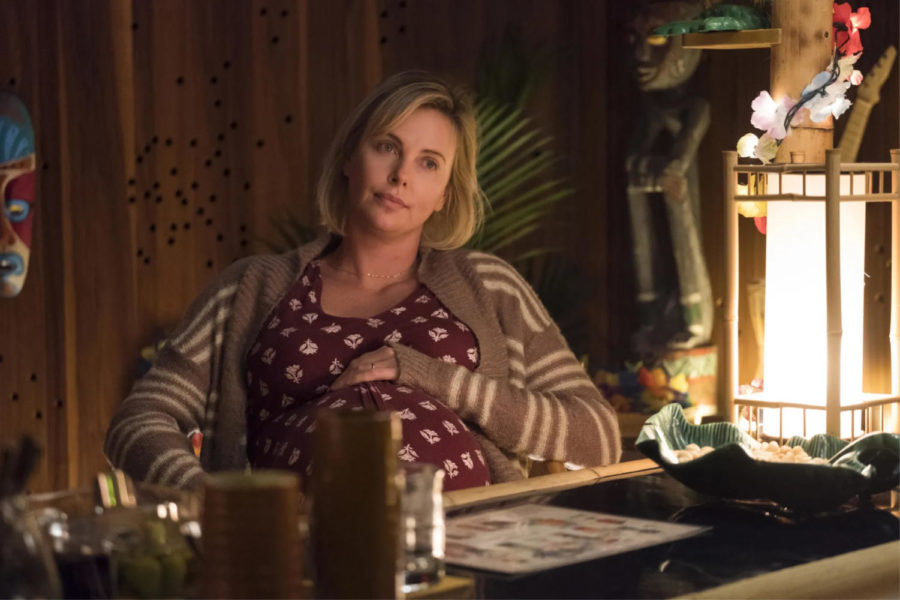‘Tully’ is a surprisingly masterful look at motherhood and change
September 13, 2022
This past summer was the first summer I spent in my own apartment in Lexington. I spent it the same way I’ve spent every summer: watching obscure movies on Netflix.
“Tully” was one of those, and I found it simultaneously unfamiliar and enlightening.
“Tully,” released in 2018, was written by Diablo Cody, directed by Jason Reitman and stars Charlize Theron and Mackenzie Davis.
The movie centers around Marlo (played by Theron), who acquires a night nanny, Tully (played by Davis), after the birth of her third child. Tully and Marlo eventually become close friends, with Tully helping Marlo to rediscover who she is, reinvigorate her life and get out of the rut of her postpartum depression.
Movie reviewer Christy Lemire said the film is “no confectionery ode to motherhood,” and I definitely agree. I may be a bit biased because I do not plan on giving birth to any children but, upon watching this movie, I continuously questioned why anyone would choose to do so.
At one point, Marlo comments, “My legs have veins, my tits have veins, my veins have veins.” There are also multiple scenes of Marlo breast pumping, which seems incredibly uncomfortable. Sure, the new baby is great and all, but we can’t ignore the physical toll she took on Marlo.
The movie also explores Marlo’s relationship with her husband Drew. The two are not caught up in any passionate whirlwinds of romance. Multiple scenes show Drew gaming while Marlo works out logistics of infant care with Tully. However, Marlo seems to appreciate the stability her relationship with Drew gives her, even if it is lacking in passion. Out of every horse on the carousel, Marlo says, Drew is the bench.
Consider all of this combined, and it’s no wonder Marlo seems lost. This provides a convenient path for Tully to come in and reinvigorate her life. At the end of the movie, though, comes a twist that — not to brag — I had guessed from the scene where Marlo persuades Tully to have sex with her husband.
Tully was never real. She’s a manifestation of Marlo’s brain, a memory of Marlo from the time she was 26 and living in a Brooklyn loft. She was made real to get Marlo through the trials of motherhood and connect her to her past. At one point, she takes her to her old apartment, and Marlo is blown away by the fact that the building now has a lobby.
At another point, Tully and Marlo discuss the Ship of Theseus paradox, but with a people-centered twist. If someone has shed and reproduced all their cells, as their bodies naturally do, are they still the same person? Marlo says no.
“You’re just not you without your original parts,” she says.
When I started this movie, I thought it would be an interesting, realistic look into something I do not plan on experiencing, meant to broaden my horizons. What I discovered, though, was that everyone can find a way to relate to this movie, whether or not they plan to be parents.
I know that personally, the narratives of Marlo’s children resonated with me. I related to the oldest daughter, Sarah, and her struggles with anxiety. I nearly teared up during a moment where Sarah shares information about her favorite series, “Monster High,” with her mother. As someone whose anxiety made them incredibly nervous to share their own interests with their parents, this bonding moment between Marlo and Sarah was a highlight of the movie for me.
I also appreciated how Cody and Reitman handled the narrative of Marlo and Drew’s autistic son, Jonah. Instead of being treated like an insurmountable hurdle, Jonah is just shown as another child the parents care about and fight for.
Jonah shifts schools at one point, and in a very relatable situation, he is anxious about the transition. While using the bathroom in the new building, he becomes overstimulated by a loud toilet. His mother, who is also anxious about the transition, tells him that the world is a loud toilet, and he will have to adjust. However, she is not angry at him; she is just expressing her own overwhelming feelings about the changes in her own life.
What stands out the most in this movie is the theme of change. We all have our own Brooklyn lofts. I, for one, have lived in a lot of places, and I plan on living in a lot more. I’m halfway through my planned two-year stay in the Lexington apartment I currently call home, and one of these days, I’m going to walk out of it for the last time.
We’re going to change. Our world is going to change. Our relationships with those we love are going to change. Our carousel horses may start feeling like benches. Our lofts are going to have lobbies built into them. Sometimes, all the change is going to make the world seem like a loud toilet, and we’ll feel like strangers in our own surroundings.
In the end, though, we’ll still be the same people. No matter how much we change on the outside, we’ll still have the memories and experiences of our past. It may take a while to find, but there’s a Tully in each of us, ready to help us grab whatever life throws at us.
































































































































































